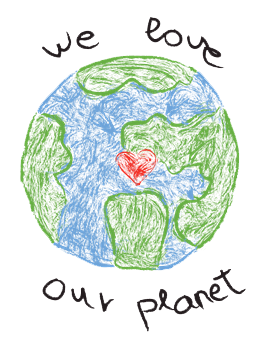Pigs&Roses cares about all stages of product manufacturing. The environmental impact is really
minimized, local employment is generated and work is done ethically to achieve a creative
product, made with sustainable materials and that carries a message to new generations.

SUSTAINABLE FABRICS
Pigs&Roses only makes its products with fabrics 100% sustainable low carbon footprint fibres.
For sustainable materials, we refer to materials that are conventional and that have a lesser
impact on nature and human health, such as organic cotton or linen. This is especially
important when we work with children.
20% of our products are made with tencel, 4% linen, and 76% organic cotton.
Know more about GOTS Certification and about the TENCEL.
ECO FRIENDLY PRINTING
The use of chemical products is unfortunately necessary in all types of printed textile product.
For Pigs&Roses, the fight is very important to avoid toxins that are harmful to the environment,
animals and our health, that's why our fabrics are printed by eco friendly digital stamping,
which replaces the traditional infinitely more polluting one. This makes our product more
expensive but it makes us feel that we are moving in the right direction.
Stamping and textile dyeing processes are not, in general, ecological. In conventional
processes, thousands of liters of contaminated water are generated every hour. This does not
happen with digital printing. In digital printing, tap water is not part of the process. On the
other hand, the classic inks are highly polluted elements and of high ecological cost to
manufacture. Additionally, digital stamping inks are much more liquid, whereas in the process
of traditional stamping, you can use more than 100 liters of ink on each colour per hour (of
which more than half goes down the drain), however with digital printing, the expense is
measured in milliliters and not a drop is lost.
On the other hand, the amount of fabric that is lost in the start-up of traditional stamping
(machine settings, calibration etc..) is immense compared to what we lose in digital printing
machines (the difference can be as large as 100 meters, to 50 centimeters). Likewise, digital
printing is the only one that does not require the fabric to be prepared in any special way and
therefore, saves the ecological cost of a bath preparation.
ETHICALLY MANUFACTURED
While the great part of the textile industry is struggling to achieve the balance of a fair
economy and a decent minimum wage, Pigs&Roses develops the entire manufacturing process
in Spain. From the elaboration of the print, the printing of the fabric, to the design of the
garment, and its cutting and making.
100% of our products are locally produced. We ensure excellence in health and safety; safe
workplaces that promote well-being. We get fair and equitable remuneration and growth
development for all those who work in this chain.
We can give total transparency to each of our steps in the manufacturing process. REUSABLE PACKAGING
We use organic cotton GOTS bags as packaging. So you can reuse them to keep your luggage,
toys, or anything else!
SOCIAL CONSCIENCE
The Pigs&Roses collections revolve around a issue of value, which we want to transmit to the
little ones and with which we actively collaborate.
CREATIVE AND FREE CHILDREN
Our social conscience includes all the links in the chain, from design and manufacturing to
communication and sales. And it just makes me think a lot about the last link, because this is a
child! It is clear that for Pigs & Roses it is important that children feel excited and comfortable
when they are dressed, but above all, we care that they feel free! We want to give children the
freedom to choose clothes that match their personality and creativity. All our clothes are
unisex, and we never categorize or show our products according to the standardized gender.
YOU
In all of us, there is the power of change. And that it is real, that the last link in the chain is as
important as the first concern.
What can we do to contribute to the care of the planet? We took these tips on board.
Your participation is very important. Ask the brands about their sustainability work and
support the candidates.
Buy garments made with biodegradable fabrics.
All fabrics release microfibers in the wash. The problem is that microfibers in synthetic cloth
are not biodegradable. These plastic fibers sometimes end up in our oceans traveling the
food chain. In the long term, inorganic materials are harmful to the global environment,
including all living creatures, and you.
Lengthen the life of your clothes. This is achieved by buying high quality garments with a
design that is attractive from generation to generation.
Take care of your clothes and wash the garments according to the manufacturer's
recommendations. Take your time when removing stains and sewing accidents.
When it really is time to say goodbye to your clothes, you can donate your them to an
organization, where they follow the path of recycling.
|